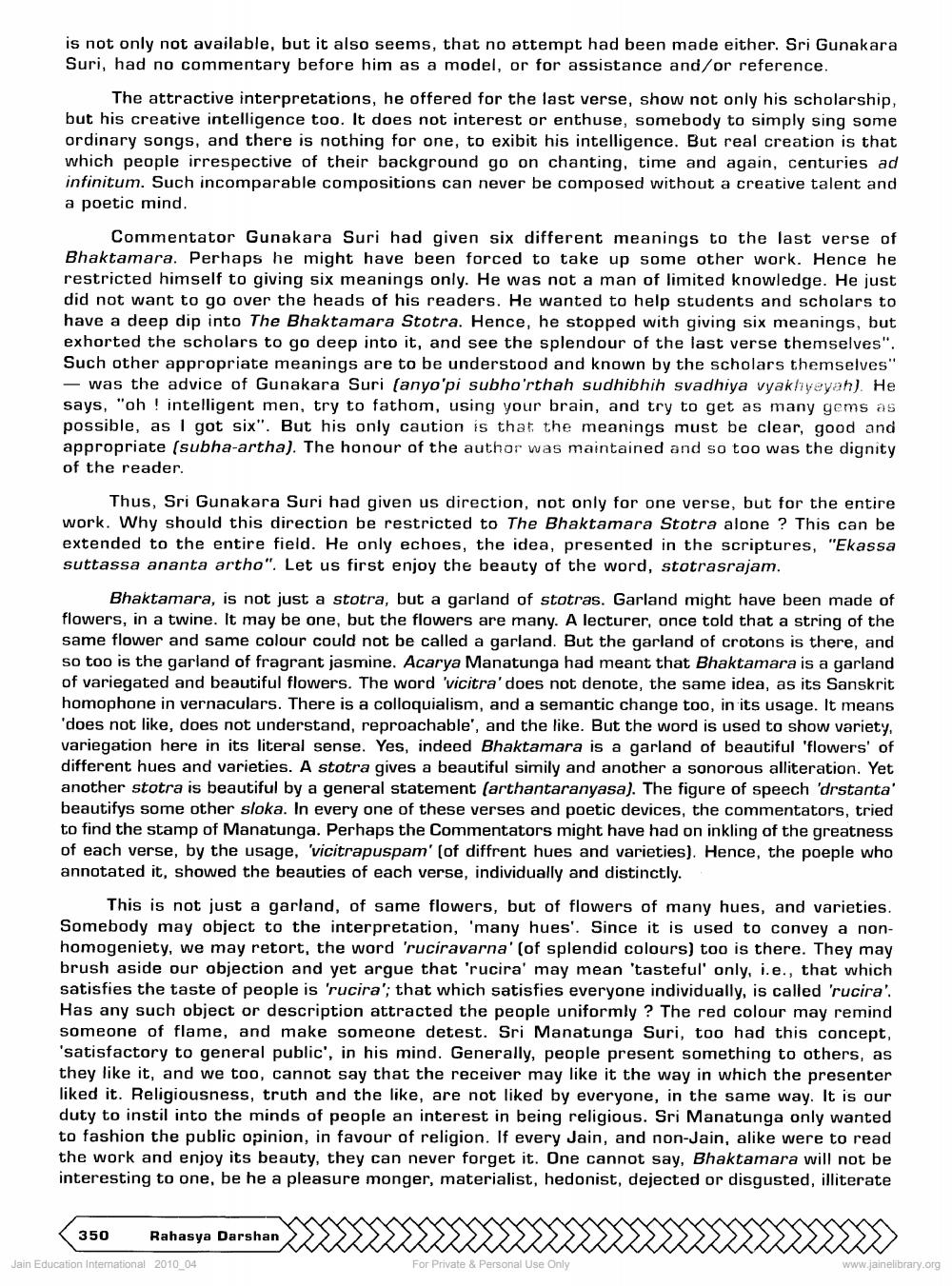________________
is not only not available, but it also seems, that no attempt had been made either. Sri Gunakara Suri, had no commentary before him as a model, or for assistance and/or reference.
The attractive interpretations, he offered for the last verse, show not only his scholarship, but his creative intelligence too. It does not interest or enthuse, somebody to simply sing some ordinary songs, and there is nothing for one, to exibit his intelligence. But real creation is that which people irrespective of their background go on chanting, time and again, centuries ad infinitum. Such incomparable compositions can never be composed without a creative talent and a poetic mind.
Commentator Gunakara Suri had given six different meanings to the last verse of Bhaktamara. Perhaps he might have been forced to take up some other work. Hence he restricted himself to giving six meanings only. He was not a man of limited knowledge. He just did not want to go over the heads of his readers. He wanted to help students and scholars to have a deep dip into The Bhaktamara Stotra. Hence, he stopped with giving six meanings, but exhorted the scholars to go deep into it, and see the splendour of the last verse themselves". Such other appropriate meanings are to be understood and known by the scholars themselves" - was the advice of Gunakara Suri (anyo'pi subho'rthah sudhibhih svadhiya vyakhyeyah). He says, "oh ! intelligent men, try to fathom, using your brain, and try to get as many gems as possible, as I got six". But his only caution is that the meanings must be clear, good and appropriate (subha-artha). The honour of the author was maintained and so too was the dignity of the reader.
Thus, Sri Gunakara Suri had given us direction, not only for one verse, but for the entire work. Why should this direction be restricted to The Bhaktamara Stotra alone? This can be extended to the entire field. He only echoes, the idea, presented in the scriptures, "Ekassa suttassa ananta artho". Let us first enjoy the beauty of the word, stotrasrajam.
Bhaktamara, is not just a stotra, but a garland of stotras. Garland might have been made of flowers, in a twine. It may be one, but the flowers are many. A lecturer, once told that a string of the same flower and same colour could not be called a garland. But the garland of crotons is there, and so too is the garland of fragrant jasmine. Acarya Manatunga had meant that Bhaktamara is a garland of variegated and beautiful flowers. The word 'vicitra' does not denote, the same idea, as its Sanskrit homophone in vernaculars. There is a colloquialism, and a semantic change too, in its usage. It means 'does not like, does not understand, reproachable', and the like. But the word is used to show variety, variegation here in its literal sense. Yes, indeed Bhaktamara is a garland of beautiful 'flowers' of different hues and varieties. A stotra gives a beautiful simily and another a sonorous alliteration. Yet another stotra is beautiful by a general statement (arthantaranyasa). The figure of speech 'drstanta' beautifys some other sloka. In every one of these verses and poetic devices, the commentators, tried to find the stamp of Manatunga. Perhaps the Commentators might have had on inkling of the greatness of each verse, by the usage, 'vicitrapuspam' (of diffrent hues and varieties). Hence, the poeple who annotated it, showed the beauties of each verse, individually and distinctly.
This is not just a garland, of same flowers, but of flowers of many hues, and varieties. Somebody may object to the interpretation, 'many hues'. Since it is used to convey a nonhomogeniety, we may retort, the word 'ruciravarna' (of splendid colours) too is there. They may brush aside our objection and yet argue that 'rucira' may mean 'tasteful' only, i.e., that which satisfies the taste of people is 'rucira'; that which satisfies everyone individually, is called 'rucira'. Has any such object or description attracted the people uniformly? The red colour may remind someone of flame, and make someone detest. Sri Manatunga Suri, too had this concept, 'satisfactory to general public', in his mind. Generally, people present something to others, as they like it, and we too, cannot say that the receiver may like it the way in which the presenter liked it. Religiousness, truth and the like, are not liked by everyone, in the same way. It is our duty to instil into the minds of people an interest in being religious. Sri Manatunga only wanted to fashion the public opinion, in favour of religion. If every Jain, and non-Jain, alike were to read the work and enjoy its beauty, they can never forget it. One cannot say, Bhaktamara will not be interesting to one, be he a pleasure monger, materialist, hedonist, dejected or disgusted, illiterate
350
Rahasya Darshan
Jain Education International 2010_04
For Private & Personal Use Only
www.jainelibrary.org




